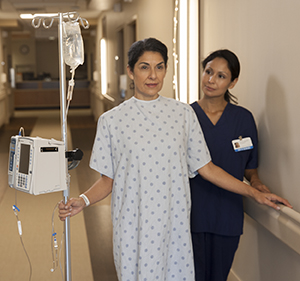Hysterectomy: What to Expect
Hysterectomy is surgery to remove the uterus. In most cases, this surgery takes about 1 to 3 hours. Knowing what to expect before and after surgery can help reduce any fears you may have. It also helps you prepare. Be sure to follow any instructions your healthcare provider gives you.
Before surgery
A few weeks before surgery, you may be asked to stop smoking, if you smoke.
As the day of surgery gets closer, you may be asked to:
-
Have blood, urine, and other tests
-
Stop taking certain medicines
-
Sign a consent form for the surgery
-
Follow any directions you are given for not eating or drinking before surgery
At the hospital
You will be given an intravenous (IV) line in your arm or hand. This line is used to give you fluids and medicines.
Just before surgery, you will be given anesthesia. This is medicine that keeps you from feeling pain. You will likely need general anesthesia. This puts you into a state like deep sleep during the surgery.
During the surgery:
-
A tube may be put into your bladder. This drains urine.
-
A hysterectomy can be done in several ways. In some cases, an incision is made in your belly, and your uterus is removed through this incision. The uterus can also be removed through the vagina or through small incisions on the stomach using an instrument called a laparoscope.
-
The incision is closed with stitches, staples, or surgical glue.
After the surgery, you’ll be brought to a recovery room. There, you will wake up from the anesthesia. Then you’ll be moved to a hospital room. Here is what you can expect during your hospital stay:
-
You will be given medicine for pain. Tell your nurse if you feel pain.
-
You will have some bleeding from your vagina. Use sanitary pads.
-
You may be given only liquids or light meals. This is to give your bowels time to return to normal.
-
You will be shown exercises to clear your lungs. Do these as often as you’re instructed.
-
You will be told when you’re ready to go home. Have an adult family member or friend drive you.
 |
| Walking soon after surgery helps you recover faster. |
Recovery at home
Follow all instructions you’re given for taking care of yourself at home. These tips can help you heal:
-
Take showers instead of baths.
-
Use pads to absorb bleeding or discharge. Light bleeding is likely at first. Brownish discharge may last up to 6 weeks.
-
Don't use tampons. Don't douche. These can cause infection.
-
Don't have sex for as long as your healthcare provider advises. This will most likely be 6 to 8 weeks.
-
Pain medicines can cause constipation. Eat fruits, vegetables, and whole-grain foods. Drink plenty of water. If you have problems moving your bowels, ask your healthcare provider whether you should use a stool softener.
-
Tell your healthcare provider if you feel down or have mood swings. You may be adjusting to the changes in your body. This is more likely if your ovaries were removed and you were not in menopause before. Medicine can be prescribed to help.
-
Don't do anything that strains your incision, such as heavy lifting.
-
Ask your healthcare provider when you can drive again. Also ask when you can return to work and exercise.
-
It will likely take 3 to 8 weeks to feel back to normal.
When to call your healthcare provider
Call your healthcare provider right away if you have any of these:
-
Fever of 100.4°F (38°C) or higher, or as advised by your healthcare provider
-
Heavy vaginal bleeding
-
Smelly discharge from the vagina
-
Bleeding, discharge, or increasing redness or swelling at the incision site
-
Pain or swelling in your legs
-
Shortness of breath or chest pain
-
Severe belly or pelvic pain
-
Painful or frequent urination
Follow-up care
Make and keep follow-up visits. These are to make sure you’re healing well. Your incision closures may be removed during a follow-up visit.
If your ovaries were removed and you’re having symptoms of menopause, tell your healthcare provider. You might want to discuss hormone therapy.
If your uterus has cancer, ask your healthcare provider what additional treatment you may need.